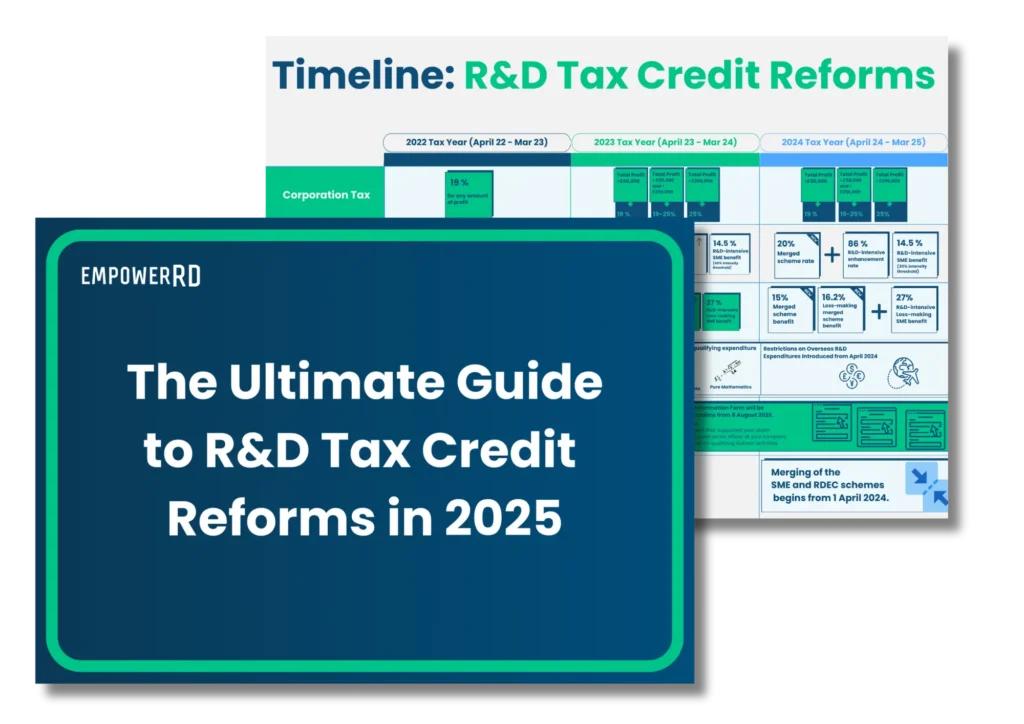The government published draft legislation on the R&D Tax credit scheme on 20 July. The proposed legislation incorporates announcements made in 2021’s Autumn Budget, as well as this year’s Spring Statement. If passed, these changes will affect businesses claiming under both R&D schemes (RDEC and SME) and will take effect for accounting periods beginning on or after 1 April 2023. The legislation is mostly in line with what we expected; below are what we think are the most significant points:
Extending qualifying expenditure
There are no surprises here: as announced in the autumn budget, qualifying expenditure will be extended to include cloud computing and datasets. Pure mathematics will also be included as an eligible qualifying expenditure for the definite accounting periods beginning on or after 1 April 2023. However, the definition of ‘pure mathematics’ has not yet been defined. This will be included within additional regulations to be published later this year. We welcome these changes, which signal that the government is embracing and incentivising modern R&D practice.
Focus on UK activities
The change that raised eyebrows the most in the Autumn 2021 Budget was the decision to refocus the R&D relief provided to activities performed in the UK. What does this mean? For accounting periods starting on or after 1 April 2023, subcontracted R&D work and the cost of externally provided workers (EPWs) will be limited to work done in the UK. There are some exemptions However, R&D activity will still likely qualify when there are material factors like geography, environment or other conditions that are not present in the UK but are required for the research. For example, deep-ocean research, or clinical trials that can only take place legally outside the UK. There’s still some uncertainty in this area, and we expect further guidance published around the exemption before April 2023.
New administrative requirements to help “tackle abuse”
HMRC has announced that all claims will have to be made digitally, except for those companies exempt from the requirement to deliver a Company Tax Return online. Claims will also require a breakdown of costs across categories, and the inclusion of a brief summary of the R&D activities performed. Claims will also have to be signed off by a senior officer of the claimant company, including details of any advisory agent used as part of the submission.
Requirement to notify intention to claim
First-time claimants will need to notify HMRC in advance that they intend to file a claim. This will be done through a digital service and must be completed within 6 months from the end of the relevant accounting period to which the claim relates. If you’ve claimed before within any of the previous three years, you won’t need to pre-notify HMRC.
Additional points
HMRC will have more authority
The most recent changes will give HMRC additional authority to recover ‘excessive’ or overpaid credits from either SME scheme or RDEC scheme claimants.
Flexibility with amendments
If your SME claim is deemed incorrect, you will be given additional time to correct it as an RDEC claim.
Going from SME to large company status
Before, when an SME company within a group surpassed the small company thresholds, it was allowed a ‘year of grace’ in some circumstances before being reclassified as a large business required to claim under the RDEC scheme. However, this ‘year of grace’ did not always apply to other companies in the group, and their status could change immediately. This anomaly will now be changed so that other companies in the group can keep their SME status for one year after the first company has switched, subject to the usual conditions.
Payment requirement
The new legislation confirms HMRC’s view that R&D expenditure must actually have been paid before the R&D claim is made.
Going Concern relaxation
The ‘going concern’ requirement for claiming R&D tax reliefs will be relaxed where companies only lose this status because they have transferred a trade to another group company.
Feedback on these proposals
This legislation is currently in draft form and HMRC have asked for comments and representations by 14 September 2022. As usual, EmpowerRD will be providing a full response to HMRC about these proposals and speaking to clients and relevant stakeholders about the potential impact. Please get in touch with one of our experts today if you would like to feed into our response or if you have any further questions.













